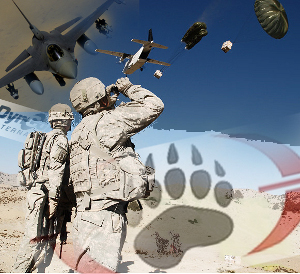Editorial
The privatisation of security: a trend in the present, a challenge in the future

A review of what has been written about the Post-Cold War turns up many references to the changing nature of armed conflicts, states' loss of the monopoly of legal mass violence, the convergence between the agendas of peace, development and human rights, and the privatisation of security in the North and South.
Issue 9 of Peace in Progress looks at just one aspect of this modern trend - the relationship between security and private companies, particularly in conflict situations, in preparation for the international symposium that the ICIP is preparing on the subject.
First, since the Post-Cold War, security has evolved in two directions that are to some extent contradictory. On the one hand, it is now a multidimensional, people-centered process, in which the challenges and threats and the subjects of protection have changed. The result was an increasing demilitarisation of the concept of security, at least until September 11, 2001, and the central importance of approaches along the lines of human development, such as human security and the responsibility to protect. Meanwhile, security, including domestic security, has gradually ceased to be a public good, or a basic service that states have to provide for their citizens (to guarantee their physical integrity), and has become - de facto albeit not de jure - a private commodity only available to those who can pay for it.
The clearest example is security in many countries in the South and in some emerging countries, where there has been a proliferation of private "armies," private armed agents that are ubiquitous in both public and private establishments, special forces responsible for the security of the president or senior figures in regime, resources contracted to mercenaries, etc. It is important to be aware of the contradictions that this dual devlopment creates, as it even affects the discussions related to sensitive issues such as United Nations peacekeeping operations: where it maintains the non-authorisation of the use of private companies on missions with a direct mandate from the Security Council, as well as the existence of documents prepared by private companies that argue for the advantages involved in using their services (I remember the case of the United Nations operation in Congo, Monuc, in 2003). In addition, the figures in operations that are not under the United Nations mandate, such as Iraq and Afghanistan, give pause for thought: in Iraq, the maximum number of U.S. personnel was 185,000 employees of private security companies, compared to 165,000 soldiers; in Afghanistan, the number of private personnel has fluctuated between 130,000 and 160,000.
Second, the subject requires a very conceptually precise and open approach, analysing the advantages and disadvantages, and highlighting the viewpoint of plural actors and interests. With respect to plurality, you can see that this issue features both military professionals and private companies, as will be the case in the seminar.
As for the need to be conceptually precise, a few examples will suffice. These companies are not a uniquely American or Western phenomenon. Some of the leading private security companies are owned and operated in the South, such as the famous Executive Outcomes, founded in South Africa in 1989, by soldiers and demobilised personnel (including a considerable number of people with links to the armed wing of the African National Congress), and who were also equipped with heavy and sophisticated combat and transport equipment. In 1993, the Angolan government hired them to fight against the Unita rebels and to recover the diamond mines controlled by the rebels; they were hired in 1995 by the government of Sierra Leone to fight the RUF. In addition to this and other cases, the interests of private security companies are linked to mining companies, or others: there is clear evidence of the existence of structural links between the company and Heritage Oil and Gas and Branch Energy.
A second example is the debate over whether to make a distinction between "private security companies" and "private military companies": the former basically provide services such as risk analysis, protection and security for people and places and strategic institutions, while the latter provide well-trained staff for training troops or for deployment in specific areas, on their own or accompanying other units. The term "private military companies" is now in common use, but the truth is that they do not all do everything.
A final example is all the problems of accountability and transparency, or those arising from the legal status of private security personnel assigned to missions in the field. In Iraq, they were granted immunity by an order from Paul Bremer, the head of the Coalition Provisional Authority (Order 17). Subsequent developments, such as codes of conduct and self-regulation produced by associations of companies in the sector (the International Peace Operations Association; British Association of Private and Security Companies; Global Peace and Security Operations Institute) do not provide sufficient guarantees.
The current trend towards the privatisation of security will increase in the future, due to the importance of peace-building operations and the tendency to reduce the number of troops in professional armies. The subject must be considered carefully, and thought of as a challenge for the future, in both senses of the word - as a danger and an opportunity.